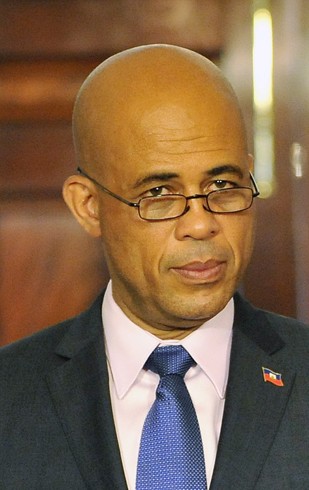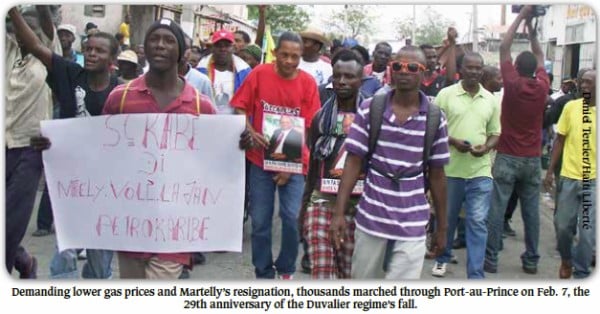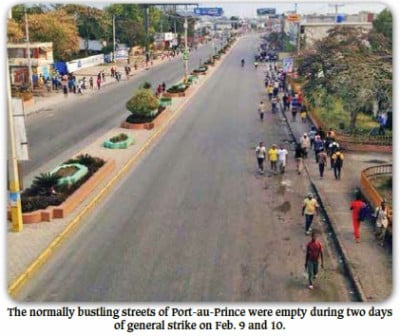Haiti: Two Days of Demonstrations and General Strike: “Down with he UN Occupation”, “Down with the President and Prime Minister”

In the past week, two massive demonstrations and two days of a successful general strikes have rocked the government of President Michel Martelly and Prime Minister Evans Paul. The principal demands are for the lowering of gas prices and for the resignation of both Martelly and Paul. Demonstrators also call for the 7,500-soldier UN Mission to Stabilize Haiti (MINUSTAH) to leave immediately.
Thousands marched through the capital on Feb. 5 and again on Feb. 7, the 29th anniversary of the fall of the Duvalier regime in 1986. “The gas thief in the National Palace has to go!” demonstrators chanted at both demonstrations. “The gas thief in the Prime Minister’s office has to go! Martelly, the foreign colonists sent you to destroy the country! But the people are rising up, and you have to go! Do you hear that Obama? Do you hear that Bill Clinton?”
A 40-year-old bus driver spoke to a group of journalists as the demonstration on Feb. 5 was in the capital’s main square, the Champ de Mars. “Today, we are in the time of Hitler,” he said. “The Gestapo killed the Jews. In Haiti, Martelly’s police are killing Haitians. I am ready to die to rid the country of vampires of the ‘tètkale’ [bald-headed] regime. I have nothing to regret. I leave behind me only misery.”
University students, along with other popular and progressive organizations, are also part of the protests. On Feb. 5, they organized a sit-in outside the offices of the Ministry of Economy and Finance to force the Martelly/Paul government to lower fuel prices. The Haitian police’s Company for Intervention and the Maintenance of Order (CIMO) fired tear-gas canisters and water cannon at students at the Faculty of Ethnology and the Teachers College (École Normale Supérieure).
On Feb. 7, the march went straight to Petion-ville, the posh mountain suburb where Martelly and Haiti’s financial oligarchy live. In deeply divided Haiti, the people “from below” wanted to show those that live “on high” that they are entitled to a decent life.
“100 gourdes [$2.13] for a gallon of gas!” the demonstrators chanted. “Three gourdes [6 cents] for a bus ride! Down with Martelly! Down with Evans Paul! Down with the gas thieves! Down with the MINUSTAH!”
As the demonstrators marched along the Bourdon Road, they passed the house of well-known notary Jean Henry Céant, whom they also showered with insults and charges of stealing land, colluding with Martelly, and being a traitor to their movement.
At the corner of Lalue and Avenue Martin Luther King, the police prevented the protesters to continuing on towards the Champ de Mars. The demonstration detoured down the Nazon Road to Poupelard Avenue, where the police dispersed it with tear gas. But the demonstrators again regrouped, saying they wanted to bring solidarity to the students at the Faculty of Ethnology, Faculty of Law, and Teachers College. But at Rue Geffrard, the police fired rubber bullets at protesters, wounding at least three. Rony Timothée was shot in the face, Jean-Marie Germain was shot in the leg, and an unidentified person was also hit.
This kind of repression did nothing to dampen the success of the two-day general strike called by the opposition for Feb. 9 and 10. All commerce, banks, government offices, and schools were paralyzed. All vehicle traffic in the capital and its suburbs, as well as the long distance routes linking Port-au-Prince with provincial cities, was completely stopped. Even the capital’s Toussaint Louverture International Airport and the assembly factories could not function.
Young people around the city took the opportunity to play soccer. Groups of people gathered on street corners to discuss the situation, while others went about their daily activities on foot.
“The price of gasoline is really too expensive,” said one man in the street. “We must all make an effort to force the government to lower fuel prices, which will help lower food prices.”
Following a transport strike on Feb. 2 and 3, the government signed a deal to lower the price of gas to $4.15 (195 gourdes) from $4.58 (215 gourdes). But with a gallon of gas in the U.S. selling on average at $2, Haitian are demanding a similar price.
During the strike, the Haitian police attacked people in poor neighborhoods and students at the university with tear gas, rubber bullets, and water cannon. Several journalists were also injured and taken to the hospital for treatment.
There were 20 arrests in the capital during the strike’s first day, said a police spokesman. On Feb. 9, demonstrators stoned a presidential cortege on National Highway No. 1 near Montrouis, and police opened fire, seriously wounding five people, among them Grégory Joseph and a woman known as Roselène. A 6-year-old boy by the name of Wildens was asphyxiated with tear gas.
In Arcahaie, students of the Charles Bélair High School took to the streets to demand the government get teachers back in their classrooms.
“They have to pay the teachers so they can come to work!” the students chanted. “Long live education, down with waste, down with Carnaval!” (The three days of Carnaval in Haiti are from Feb. 15-17.)
Meanwhile, on Feb. 10 in the southeastern city of Jacmel, students also took to the streets to demand that their teachers be paid so they could return to their classrooms.
The general strikes coincide with the indefinite strike which public sector teachers have undertaken since Jan. 13 to demand payment of salary arrears, their letters of appointment, their insurance cards, and acceptable working conditions in schools and the payment of schools taking part in the Free and Compulsory Universal Schooling Program (PSUGO), for which the Martelly government illegally collected $1.50 on international money transfers and five cents on every international phone call minute. These levies by the phone authority CONATEL and the Bank of the Republic of Haiti (BRH) are valued at over $230 million from June 2011 to January 2015. This amount has apparently been used for anything but education.
The Haitian people completely rejected appeals by government officials to not observe the strikes. De facto Prime Minister Evans Paul, Social Affairs and Labor Minister Victor Benoit, Economy and Finance Minister Wilson Laleau, and the Director General of the National Police of Haiti Godson Orélus carried out a systematic radio campaign to counter the strike over the past weekend. They made several arrogant and threatening statements, but people do not respect them and stayed home. Those who currently hold political power in Haiti do not enjoy the people’s trust.
Through these recent actions, the opposition has demonstrated that it has strength and popular support to oust the Martelly/Paul regime, but the embassies of the United States, France, and Canada along with their agencies – MINUSTAH, the EU, and the OAS – support the regime. Former Congolese Prime Minister Patrice Lumumba once said:” Without struggle, you will get nothing, not today, not ever.” Today, the Haitian people appear ready to struggle for their demands, despite the great odds they face.



